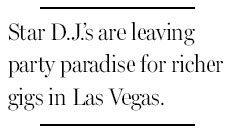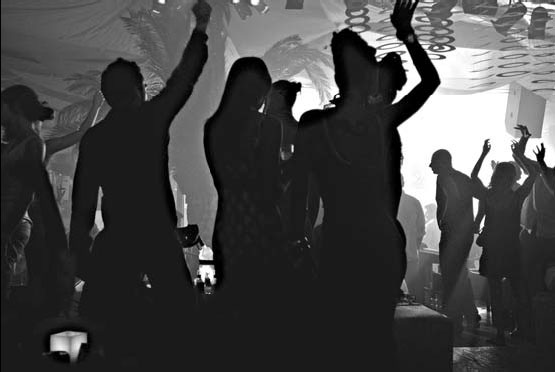Change looms at Ibiza electronic dance club
Updated: 2013-04-21 07:50
By Alexei Barrionuevo and Ben Sisario(The New York Times)
|
|||||||||
|
Owners of Pacha, the dance club on Ibiza, are tired of overpriced D.J.'s. Stefano Buonamici for The New York Times |
One dance club, Pacha, has dominated the Spanish party paradise of Ibiza since the 1970s. Built on former marshland, this island disco and its all-night parties have become global symbols of hedonistic glamour, and the business has expanded to Buenos Aires, New York and beyond.
Lately Pacha's profits have soared along with the growing popularity of electronic dance music. But so have the fees demanded by the top D.J.'s, to the annoyance of Ricardo Urgell, the 75-year-old Pacha patriarch who runs the club as a family business. Last year he decided that enough was enough.
He fired his longtime music director, Danny Whittle, and did not renew the contract for Erick Morillo, a Pacha regular for more than a decade, one of a chain of departures by other headliners like Tiesto, Luciano and Pete Tong. Only one big name, David Guetta, will return this summer.
"The D.J.'s wanted more money to play less," said Jose Urgell, known as Piti, who is Mr. Urgell's 65-year-old brother. "It was an abuse. We had to come up with a new plan because the old one was going to explode."
The Urgells' move to shake up their D.J. lineup reflects a growing friction in the dance subculture as the music goes mainstream. Budgets are ballooning, with superstar D.J.'s now commanding hundreds of thousands of dollars a night in the megaclubs of Ibiza and Las Vegas, where they once spun anonymously.
Tiesto, perhaps the world's most popular D.J., is skipping Ibiza this summer. Instead his world tour includes Hakkasan Las Vegas, a 7,400-square-meter megaclub set to open this month at a reported cost of $100 million.
"I've played in Ibiza every summer for the last 10 summers, and I felt like it was time for a change," Tiesto said through his publicist.
The Urgells chafed at the growing power of celebrity D.J.'s and their handlers and said they longed to return to simpler times when the club wasn't ruled by money.

Ricardo Urgell, the son of a Barcelona engineer, built Pacha in the early 1970s on a desolate plot he bought for about $14,000. After its opening in 1973 the club came to represent ultracool debauchery and an escape from the conservative moral code of Francisco Franco, the Spanish dictator. Native Ibicencos mixed with artists, hippies and thieves hiding from the authorities.
But as the scene grew, the elder Urgells became disenchanted by the music that made them millionaires.
"It's monotonous sound and volume; it's bodies squeezed together, it's a little masochistic," Ricardo Urgell said in 2011.
Electronic music, Piti Urgell said in March, "hasn't evolved in 20 years and is for idiots."
The Urgells say that things began to change after 1999, when Ricardo Urgell's oldest son, Hugo, hired Mr. Whittle, a former British firefighter and rave organizer. Mr. Whittle introduced a record label and a magazine, and signed top D.J.'s like Mr. Guetta and Fatboy Slim.
The changes raised Pacha's profile, but the Urgells grew annoyed when Mr. Whittle began allowing Pacha D.J.'s to spin at the Ushuaia Beach Hotel, which put on afternoon pool parties, taking its cue from Miami and Las Vegas.
"The question is, 'What is attracting people away from Ibiza?' and that is Vegas," Mr. Whittle said.
The economics of Big Dance are hard to ignore. Pacha Ibiza, with a capacity of about 3,000, grossed more than 30 million euros (about $40 million) last summer, compared with 7 million euros in 1999, Mr. Whittle said. Pacha paid some acts more than 100,000 euros (roughly $130,000) a night, he said, but all of those D.J.'s generated three times that amount in revenue.
"This is going to cost them a fortune," Mr. Whittle said of Pacha's new direction.
In the end the Urgells may not care anymore. This summer they are bringing in more underground acts, like the Israeli D.J. Guy Gerber, 38,who is taking over for Mr. Morillo on Wednesdays. He has promised to feature indie bands, magicians, fortunetelling machines and maybe a puppeteer on his weekly show, "Wisdom of the Glove."
"I was trying to create a night to bring back Ibiza like it used to be 30 years ago," Mr. Gerber said. "I want to freak people out."
The New York Times
(China Daily 04/21/2013 page12)
